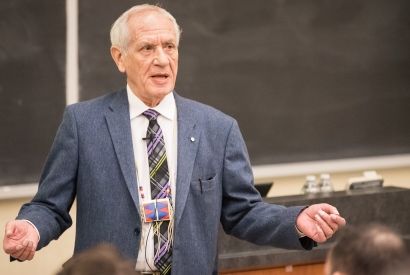
“An architect with incredible recognition and an Elder who incorporates in his being what it means to be Indigenous,” was how Douglas Cardinal was introduced to Queen’s Law community members by his friend, lawyer Michael Swinwood.
Cardinal came to Macdonald Hall on March 31 to share with students, faculty and staff an Indigenous perspective on what Canadian society looks like. His talk described the differences between two world views and urged listeners to think differently in order to stop the damage being done to the earth, to empower women and to bring the two worlds together.
“I wanted to show you the two different world views, to see that although we’re fellow brothers and sisters we have a whole different reality going on,” said Cardinal.
He described the dominant culture’s world view as a “hierarchical society based on power and control” that keeps everyone within it in line by fear; whereas the Indigenous worldview is centred on individual responsibility, respect and self-worth. “It’s based on peace, harmony, love and contribution. It’s not based on laws created by man; it is created by laws observed by nature.
“Creativity is not in the domain of what you know; that’s already been created,” he advised students. “Creativity is in the domain of what you don’t know you don’t even know. That’s where the eagle flies. That’s where the power is – in what you’re willing to find out.”
Professor Jacob Weinrib described the visit as sensational. “His lecture enabled law students to appreciate what Canadian society looks like from an Indigenous perspective and what that perspective has to say about the nature of law, morality, family and education. Exposure to this perspective is essential for anyone who wants to think seriously about reconciliation between Aboriginal and non-Aboriginal peoples.”
Student attendee Megan Pfiffer, Law’19, was impressed with Cardinal’s focus on the fundamental differences between Western and Indigenous perspectives. “Those differences demonstrate the need to question the basic assumptions we make about justice and reconciliation.”
Her Law’19 classmate, Adriana Zichy, agrees. “The lecture really drove home the message that reconciliation and justice for Indigenous people will only happen if we come together to rethink the foundations of our current system of laws and governance.”